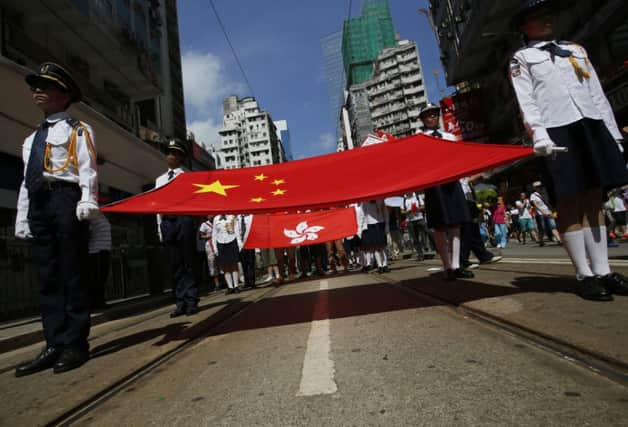80,000 fight democracy with Hong Kong march


Pro-democracy activists have staged huge protests, the most recent on the 1 July anniversary of the day Hong Kong was handed back to China from Britain.
Public discontent in Hong Kong is at its highest for years, with concern over Beijing’s influence over elections.
Advertisement
Hide AdAdvertisement
Hide AdThe city’s police estimated yesterday’s turnout at more than 110,000 people, but a specialist polling group based at the University of Hong Kong put the figure at around 80,000.
“We want to let the world know that we want peace, we want democracy, but please, do not threaten us, do not try to turn this place into a place of violence,” Robert Chow, co-founder of the pro-government Alliance for Peace and Democracy,” said.
Political rallies are a common sight in Hong Kong, a special Chinese city with a high level of freedom. But large-scale demonstrations supportive of the Chinese government in Beijing are extremely rare.
The demonstrators – much older than their pro-democracy rivals and clearly mobilised by dozens of pro-China clan organisations – carried signs opposing the civil disobedience movement called Occupy Central.
Questions have been raised about the legitimacy of the demonstration. Hong Kong media reports suggested some companies and business groups had asked employees to take part.
“Occupy Central is an extreme way of protest,” said Terence Chung, a company manager who joined the march. “Using legal ways to express opinions is all right. If it comes to an irrational protest, social order will be disrupted.”
“I don’t understand what Occupy Central is for,” said a 54-year-old construction worker, who gave only his surname, Siu, and turned out with his daughter. When asked why he joined the rally, he would only say that it was because he had some free time.
Despite those controversies, Johnson Yeung, a pro-democracy activist who organised the 1 July protest, insisted the rally was indeed an historic event.
Advertisement
Hide AdAdvertisement
Hide Ad“For the first time since the handover in 1997, the central government has organised a mass rally of this scale. It really shows their commitment against Occupy Central,” he said.
The large turnout is a reminder there is still no consensus in the battle for Hong Kong’s political future. In the other camp, pro-democracy activists from the Occupy Central group have said they would mobilise protesters to take over some of the busier areas of the central business district if electoral reform is not put in place.
City authorities say such an occupation would be illegal however, and argue that it could tarnish Hong Kong’s reputation.
Hong Kong’s next elections will take place in 2017, and China says it will introduce universal suffrage for the vote.
A huge march on 2 July was organised by pro-democracy activists campaigning for elections independent of Beijing.
However the current chief executive of Hong Kong CY Leung was elected by a committee largely loyal to the Chinese government. Pro-democracy protesters fear that the shortlist of candidates to replace him will be a similar group also loyal to Beijing.